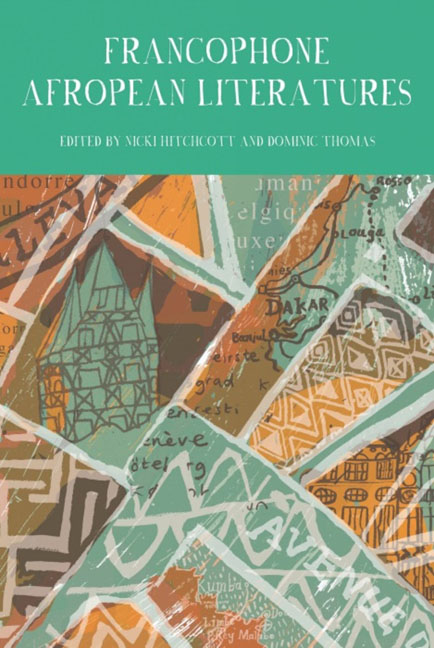Book contents
- Frontmatter
- Contents
- Introduction: Francophone Afropeans
- Essays
- Afropeanism and Francophone Sub-saharan African Writing
- The Transatlantic Poetics of Fatou Diome
- Corps Sans Titre: ‘Fleshiness’ and Afropean Identity in Bessora's 53 Cm
- Already Here: Sami Tchak's Afropean Generation
- Paris Polar: Afropean Noir in the City of Light
- Mapping Afropea: The Translation of Black Paris in the Fiction of Alain Mabanckou
- Relighting Stars and Bazaars of Voices: Exchange and Dialogue in Leonora Mianos Tels Des astres eteints and Alain Mabanckous Black Bazar
- Sex and the Afropean City: Léonora Miano's Blues Pour Élise
- Towards an Afropean Cosmopolitanism: Hospitality, Friendship and the African Immigrant
- Afropean Masculinities as bricolage
- Short Stories
- Notes on Contributors
- Index
Towards an Afropean Cosmopolitanism: Hospitality, Friendship and the African Immigrant
from Essays
- Frontmatter
- Contents
- Introduction: Francophone Afropeans
- Essays
- Afropeanism and Francophone Sub-saharan African Writing
- The Transatlantic Poetics of Fatou Diome
- Corps Sans Titre: ‘Fleshiness’ and Afropean Identity in Bessora's 53 Cm
- Already Here: Sami Tchak's Afropean Generation
- Paris Polar: Afropean Noir in the City of Light
- Mapping Afropea: The Translation of Black Paris in the Fiction of Alain Mabanckou
- Relighting Stars and Bazaars of Voices: Exchange and Dialogue in Leonora Mianos Tels Des astres eteints and Alain Mabanckous Black Bazar
- Sex and the Afropean City: Léonora Miano's Blues Pour Élise
- Towards an Afropean Cosmopolitanism: Hospitality, Friendship and the African Immigrant
- Afropean Masculinities as bricolage
- Short Stories
- Notes on Contributors
- Index
Summary
This chapter explores the intersections between cosmopolitanism, hospitality and the African immigrant in Wilfried N'Sondé's novel Le Silence des esprits [The Silence of the Spirits] (2010). Born in Brazzaville, Congo, and currently residing in Berlin, the writer and musician made his literary debut with Le Coeur des enfants léopards [The Heart of the Leopard Children] in 2007, for which he won the prestigious Prix des cinq continents de la francophonie. He followed it up with Le Silence des esprits in 2010 and Fleur de béton [Flower in Concrete] in 2012. In all three texts the impoverished Parisian banlieues serve as the principal backdrop to the stories of second–generation immigrants, the anonymous first–person narrator in Le Coeur des enfants léopards, Clovis Nzila in Le Silence des esprits and Rosa Maria in Fleur de béton. While these narratives offer a realistic depiction of the lives of immigrants (of all ethnic and religious affiliations) who are economically, socially and ethnically marginalized from mainstream society, they also contain in their unfolding the redemptory poetry of hope and shared understandings. I am suggesting here that Wilfried N'Sondé's writing translates an ‘Afropean cosmopolitanism’ – a poetic blend of cosmopolitanism as hospitality (Baker, 2011) and guest friendship (Gandhi, 2006) that engages in a resisting discourse against the hegemonic violence of global interactions (de Sousa Santos, 2002) through the affective practice of cosmopolitanism as conversation (Appiah, 2006).
Cosmopolitanism as Conversation
In his introduction to Cosmopolitanism – Ethics in a World of Strangers, Kwame Anthony Appiah asks ‘What do we owe strangers by virtue of our shared community?’ (2006: xxi). He frames his response in the notion of cosmopolitanism, a term to which he attributes two strands:
One is the idea that we have obligations to others, obligations that stretch beyond those to whom we are related by the ties of kith and kind, or even more formal ties of shared citizenship. The other is that we take seriously the value not just of human life but of particular human lives, which means taking on the interest in the practices and beliefs that lend them significance.
- Type
- Chapter
- Information
- Francophone Afropean Literatures , pp. 138 - 154Publisher: Liverpool University PressPrint publication year: 2014



